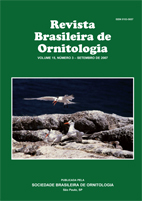
Ethno-ornithological nomenclature and classification in Três Ladeiras District, Igarassu, PE, Brazil.
Abstract
Ethno-ornithological nomenclature and classification in Três Ladeiras District, Igarassu, PE, Brazil. Ethno‑ornithology uses the principles of ethno‑biological nomenclature and classification in order to identify similarities between cognitive systems in different societies. The objectives of this research were to verify how the population of Três Ladeiras District (Igarassu, Pernambuco, Brazil) names and classifies the birds in the region and to compare the nomenclature and local classification with scientific linean species observed in large tropical rainforest fragments.
Procedures of qualitative research were utilized, as follows: selection of informants, non‑structured interviews, guided tours and bird classification using cards with illustrations of bird species. Observations and identification of birds were carried out in five forest fragments, using binoculars, tape recorder and microphone. We identified 129 ethno‑species corresponding to 141 scientific species. Ethno‑classification and nomenclature used one or more perceptual saliencies such as color, size, behavior, habitat, feeding habits, orphology, analogies, voice and onomatopoeia. Four hierarchical levels were recognized on the ethno‑classificatory system: life form, intermediate, generic and specific, based on noticeable principles of biological nature, and through interpretation of songs related to human behavior. In the study area, birds were not assigned to a symbolic value, but they do reveal the ability of informants to observe ehavioral features used as cognitive resources to differentiate species.
Procedures of qualitative research were utilized, as follows: selection of informants, non‑structured interviews, guided tours and bird classification using cards with illustrations of bird species. Observations and identification of birds were carried out in five forest fragments, using binoculars, tape recorder and microphone. We identified 129 ethno‑species corresponding to 141 scientific species. Ethno‑classification and nomenclature used one or more perceptual saliencies such as color, size, behavior, habitat, feeding habits, orphology, analogies, voice and onomatopoeia. Four hierarchical levels were recognized on the ethno‑classificatory system: life form, intermediate, generic and specific, based on noticeable principles of biological nature, and through interpretation of songs related to human behavior. In the study area, birds were not assigned to a symbolic value, but they do reveal the ability of informants to observe ehavioral features used as cognitive resources to differentiate species.
Full Text:
PDF** The work of the Editor in Chief, Managing Office, Associate Editors, and the Editorial Council of Revista Brasileira de Ornitologia is strictly voluntary, and does not involve the use of any resources and infrastructure other than the personal ones**



